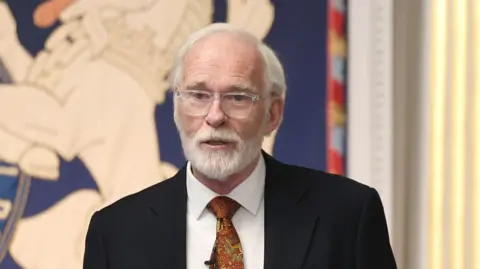BBC News NI
 BBC
BBCYoung performers have said they feel they have “no other option but to leave home” in order to pursue a career in acting due to the lack of drama school training in Northern Ireland.
There are currently no full-time, degree-level national drama schools, despite the region’s screen sector booming with hit shows like Game of Thrones, Hope Street and Blue Lights.
The lack of formal and practical training in acting, as well as financial support, means their only option is to go elsewhere at a large cost.
The Alfie Boe James Huish Academy of Theatre Arts in Belfast is a youth academy for musical theatre but does not offer a three-year degree course.
James Hutchinson, 18, from Aghagallon, who is a student there, said: “Having to pursue my dreams by going to a different country isn’t easy.
“If I could, I would stay here. I shouldn’t have to go elsewhere just to train properly.”

Mya Jansen Van Rensburg, 18, from Belfast, will soon join the Italia Conti Academy of Theatre Arts in London.
She said the opportunities in Northern Ireland simply don’t match the demand, adding: “There’s nothing here.”
“The opportunities for performing arts in general are really, really limited.”
She added that many of her friends have already given up on their dreams because they couldn’t afford to move elsewhere.
“They’re not getting enough loans or help, so they just stop,” Ms Jansen Van Rensburg said.
Derry Girls actor backs calls
Game of Thrones and Derry Girls actor Ian McElhinney has backed student calls for a national drama school, saying that accessibility and affordability are key.
“The greatest value of having a drama school here is probably controlling the costs,” he said.
“Drama schools are becoming so expensive that a lot of people don’t know how to afford it and are bypassing it… if there were a drama school on the doorstep, that might just make it more feasible.”
 Getty Images
Getty ImagesWhile universities in Northern Ireland offer a degree in drama, many students are seeking the practical experience they need to become an actor.
McElhinney explained that written work should not be prioritised over performance.
“The problem is universities here are obsessed with the degree. Because of the word ‘degree’ they seem to think you need to do a certain amount of written work.
“A lot of people who go into acting may well be writers and have very good writing skills, but they equally, may not. People didn’t go in to write essays, they went in to perform,” McElhinney said.
‘Losing out in a big way’

James Huish, who runs the Huish/Boe Academy, said too many students are being left behind.
“Just studying drama doesn’t really fill the gap of what people need to actually be in the industry,” he said.
Mr Huish says the demand for training far outweighs the capacity of current institutions and without serious investment, Northern Ireland’s creative economy could suffer.
“Children here are losing out in a big way,” he said.
Hope Street actor urges funding
For 28-year-old Bangor-born Hope Street actor, Finnian Garbutt, the absence of adequate full-time training for young actors in Northern Ireland is “hard to comprehend”.
Having attended drama school in England, the actor describes the experience as “a completely different beast” to the options available in Northern Ireland, which demands 40 hours minimum a week of intense training.
But he said it was financially “unsustainable for a lot of people” as it can cost up to £13,000 for course fees in England.
Garbutt is vocal about the need for more support closer to home.
“I’ve worked with so many people from here who are so talented,” he said.
“Funding the arts is essentially what needs to happen here.”
Remaining hopeful about the future for the arts in Northern Ireland, Garbutt said: “I’ve been able to make a career here, so I definitely think there are opportunities, just not enough.”
In a statement, the Education Authority told BBC News NI: “The policies which are implemented by Student Finance NI, in relation to eligibility of courses for which students may be awarded financial support, are determined by the Department for the Economy”.
BBC News NI has contacted the Department for the Economy for comment.





